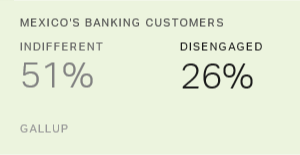WASHINGTON, D.C. -- A 2007 Gallup Poll in Mexico suggests many citizens live in the crossfire of gang- and drug-related violence -- whether they live in border states where this type of violence has spiked recently, or not.
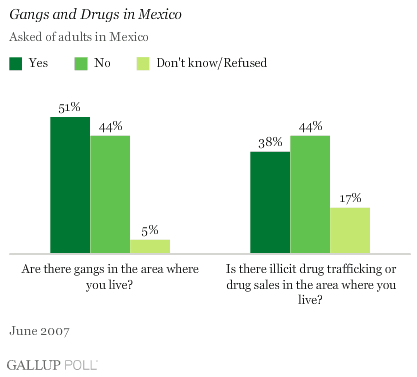
More than half of Mexicans say there are gangs in the area where they live and more than one-third (38%) say there is illicit drug trafficking or drug sales going on in their area.
Two deadly shootouts in Tijuana and Chihuahua last week between suspected drug gang members and Mexican law enforcement are examples of increasing violence near the U.S. border. Yet, Gallup data reveal that the drug gangs, as well as a growing number of street and youth gangs, operate throughout the country and affect citizens nationwide.
People in the six Mexican states that border the United States are no more likely than are those in non-bordering states to say gangs are present or that drug trafficking takes place in their area.
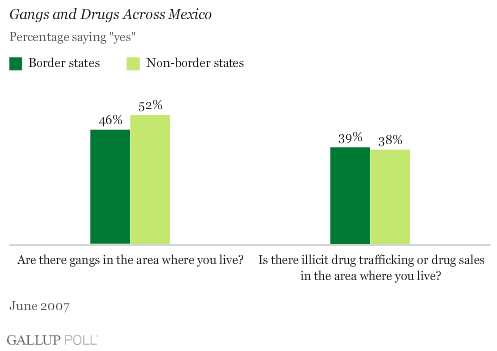
Moreover, 55% of Mexicans who live in urban areas told Gallup there are gangs where they live, only somewhat higher than the 45% of rural Mexicans who say the same.
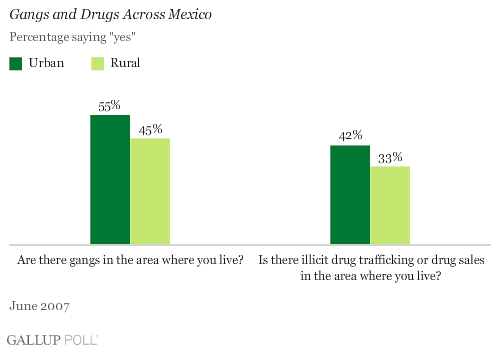
Calderon's War
More than 2,500 Mexicans reportedly died last year in violence related to gang turf wars, and the death toll so far this year -- after a particularly bloody January and multiple skirmishes with law enforcement -- is over 300. Some law enforcement officials view the recent spike as retaliation against President Felipe Calderon's "war" on drug violence, which has included deploying tens of thousands of troops to Mexico's most troubled states. Since then, Calderon said he would phase out the army's role when the country's notoriously corrupt police forces were ready to fight crime rather than facilitate it.
The situation may be exacting a toll on the perceived credibility of these institutions. Gallup surveyed Mexicans in June 2007, about six months into Calderon's "war," and found those who say they have gangs and drug trafficking in their areas to be far less likely than those who say they did not have gangs and drug trafficking in their area to express confidence in the police, the military, or the national government.
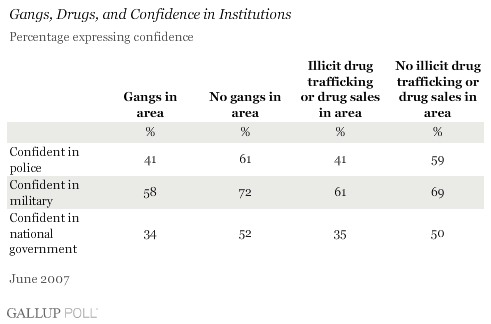
Gangs, Drugs, and Safety
Mexicans who report gangs and drug trafficking in areas where they live are also more likely to feel insecure in their neighborhoods and to say they've been victims of crime. Nearly half (47%) of those who say there are gangs in their area say they feel safe walking alone at night, compared with 70% of those who don't. The pattern and percentages hold among those who do and do not say they have drug trafficking and sales going on in their areas.
Further, Mexicans who say they have gangs or drug trafficking in their areas are more than twice as likely as those who don't to indicate they've had property stolen in the last year, and are three times as likely to indicate they've been assaulted in that same period.
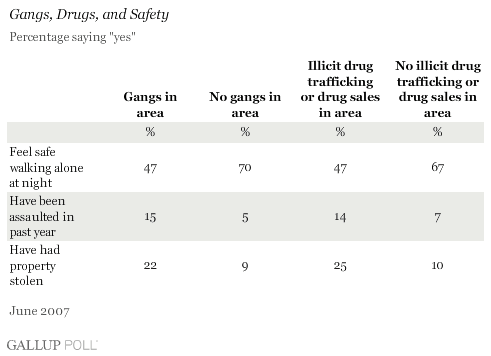
Common Concern
As dire as the situation sounds in Mexico, the percentages of residents saying gangs and drug trafficking are present in their neighborhoods are about on par with the medians for countries in the region with large populations such as Mexico, Brazil, Argentina, Peru, and Colombia. The median percentages saying there are gangs where they live and drug trafficking is taking place are 48% and 38%, respectively.
Survey Methods
Results are based on face-to-face interviews conducted in 2007 with randomly selected national samples of approximately 1,000 adults, aged 15 and older, in the five countries polled. For results based on these samples, one can say with 95% confidence that the maximum margin of error attributable to sampling and other random effects is ±3 percentage points. In addition to sampling error, question wording and practical difficulties in conducting surveys can introduce error or bias into the findings of public opinion polls.